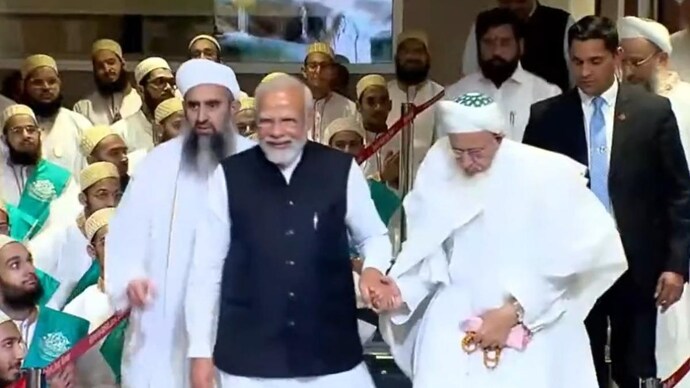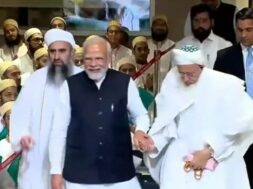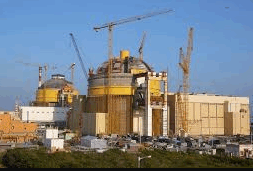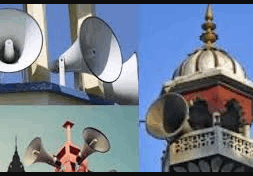
Modi Inaugurates Dawoodi Bohra Institute Campus, Calls Himself Their “Family Member”
Manas Dasgupta
NEW DELHI, Feb 10: The Prime Minister Narendra Modi on Friday inaugurated a new campus of Aljamea-tus-Saifiyah (The Saifee Academy), an educational institute of the Dawoodi Bohra Muslims, at Marol in Andheri in the financial capital of India in an outreach to one of Mumbai’s most influential communities ahead of the high-stakes municipal elections in the city.
Modi was seen walking holding hands with the head of the community, Syedna Mufaddal Saifuddin, at the new campus of the Arabic academy. Declaring himself a “family member” of the Dawoodi Bohras, Modi while inaugurating the state-of-the-art campus said, “I have known four generations of Syedna sahab’s family. I am here as a family member, not a PM. You have fulfilled a 150-year-old dream by setting up this institute,” he said.
The institute works to protect the learning traditions and literary culture of the community, and the new centre will impart Arabic learning. The new Mumbai campus of the institute is all set to begin functioning in the upcoming academic year.
Also known as Jamea, this is an academic institute exclusively catering to the education of young boys and girls from the Dawoodi Bohra community, a Shiite denomination spread across the world. While the academy’s focus will primarily be on spiritual and religious studies, the academy will also provide its students with mainstream education in association with an internationally recognised school board curriculum.
The Mumbai campus spread around 850,000 sq ft, is the second such campus in India. The first one was established over two centuries ago in 1810 in Surat, a town which is the home to a large Bohra population, in Modi’s home state of Gujarat.
The new campus boasts of magnificent white marble structures, with colourful designs engraved in different colours. It has huge corridors, ceremonial halls decorated with beautiful chandeliers, and a multilevel landscaped courtyard housing a minaret surrounded by a series of fountains and water bodies indicating flow of knowledge.
The Mumbai campus also has separate hostels for boys and girls, faculty residences, a multi-storey administration and classroom building, a library, dining halls, prayer halls and a building dedicated to teaching of Holy Quran. The prayer area is inspired by the al-Jāmiʿ al-Azhar in Cairo, the original location of the Al Azhar University, one of the oldest extant universities in the world.
The design of the campus also ensures that individuals do not have to wear shoes inside, an important aspect of Bohra culture. Globally this will be the fourth campus of the Jamea after Surat (1810), Karachi (1983) and Nairobi (2017). Aliasgar Najam, Senior Administrator of Jamea Academy said, “Mumbai is one of our important cultural centres. We have our very important mausoleum in South Mumbai. It is also home to the largest Bohra population in the world.”
Najam said, “Essentially it (the new campus) was founded for the teaching of the literature and lore of Bohra faith. In order to be a leader in today’s world, it is not enough to just have spiritual education, you need to be able to engage with individuals from all walks of life. The Jamea aims at preparing young boys and girls from the Bohra community to take up leadership roles in the community.”
Students enter Jamea between the ages of 12 to 14 after having completed years 7 or 8 of their traditional schooling. There is entrance procedure which includes memorising sections of the Holy Quran, proficiency in English, maths and science aptitude along with evaluation of IQ, emotional intelligence, religious understanding, and general knowledge.
The eleven-year programme spans from secondary to undergraduate to postgraduate studies. The multi-layered courtyard having 11 steps signify these levels. Jamea’s curriculum is designed to ensure that students are studying curricula in line with local and international education boards that administer certificate-granting examinations such as IGCSE (International General Certificate of Secondary Education) or the South Asian SSC (Secondary School Certificate). These board curricula are integrated into the overall curriculum of instruction at Jamea.
Huzefa Tawawala, Faculty Member at the Jamea, explained, “Apart from the Cambridge curriculum, the Islamic knowledge imparted at the institute is essentially in three different subjects which are the constant – Law, Literature, History. The younger students are taught the empirical sciences along with economics, sociology, business studies and home economics. And then in the higher classes you have an introduction to different disciplines such as linguistics, advanced 20th century history, introduction to architecture along with introduction to world religion.”
Students appear for local and international examinations concurrently with their studies at Jamea alongside the theological qualifications they are conferred with from the Academy itself. Jamea’s credentials have been accepted at a number of reputed national, international universities.
Elaborating on the pedagogy at the institute, Tawawala said, “One of our core principles is that there is no rigid distinction between religious knowledge and worldly knowledge. Worldly knowledge is part of the faith and our tradition of learning. It is taught at Jamea adhering to the pedagogy of the institute. For example, every student should be environmentally conscious now. You should be aware of what human action is doing to the planet. We teach that using a contemporary science textbook but we would qualify and enhance this notion by Quranic verses which encourage humanity to reflect on the bounties of nature and ponder on the creation of the heavens and earth. So that information of being a responsible climate conscious citizen will be supplemented by these verses of the Quran to ensure holistic learning and engagement.”
Building on this Alefiya Shakir, a lecturer of the Arabic Academy underlined how effective this type of learning is as she said, “A lot of people do not exactly believe in climate change. They believe that God created all of this for us to use. When we teach our students that even the Quran teaches us to care for Creation; inspired by faith, there is more motivation, inspiration to do what is right for the world or the society.”
There are currently over 500 students, 220 female students, and a little under 300 male students, with the Mumbai branch of the Jamea which started over a decade ago. While the monumental academic complex was still being built, teaching was carried out in a temporary structure. The Mumbai campus now has the capacity of up to 700 students. There are approximately 160 faculty members and staff at the Mumbai campus. In the four campuses of Jamea globally, there are about 3,000 students studying at present.














